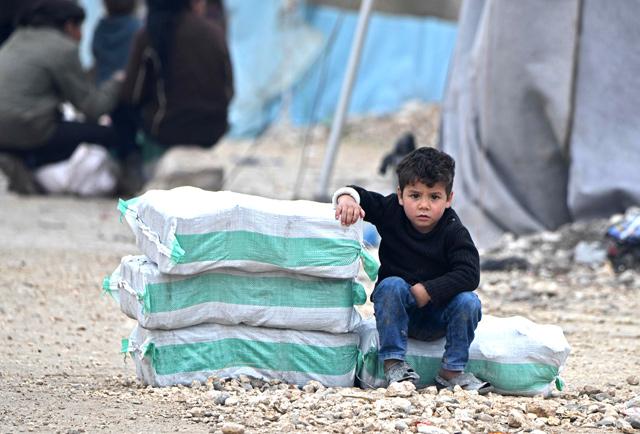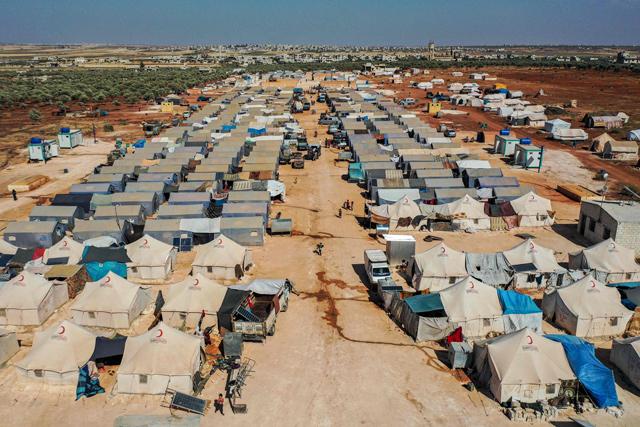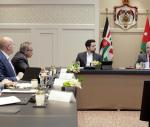You are here
Syria death toll tops 380,000 in almost nine-year war — monitor
By AFP - Jan 04,2020 - Last updated at Jan 04,2020

Umm Hatem, a Syrian woman displaced from Maar Shamshah town in the eastern countryside of Maaret Al Numan, waits as her belongings are being unloaded at a makeshift camp in Idlib in northwestern Syria, on December 31, 2019 (AFP photo)
BEIRUT — Almost nine years of civil war in Syria has left more than 380,000 people dead including over 115,000 civilians, a war monitor said in a new toll on Saturday.
The Syrian Observatory for Human Rights, which has a network of sources across the country, said they included around 22,000 children and more than 13,000 women.
The conflict has displaced or sent into exile around 13 million Syrians, causing billions of dollars-worth of destruction.
The Britain-based observatory's last casualty toll on the Syrian conflict, issued in March last year, stood at more than 370,000 dead.
The latest toll included more than 128,000 Syrian and non-Syrian fighters.
More than half of those were Syrian soldiers, while 1,682 were from the Lebanon's Hizbollah whose members have been fighting in Syria since 2013.
The war has also taken the lives of more than 69,000 opposition, Islamist, and Kurdish-led fighters.
It has killed more than 67,000 extremists, mainly from the Daesh terror group and Hayat Tahrir Al Sham (HTS), a group dominated by Syria’s former Al Qaeda affiliate.
An escalation in violence in Idlib province in recent weeks has caused 284,000 people to flee their homes, according to the United Nations.
In the northeast, Turkish troops and their proxies control a strip of land along the border after seizing it from Kurdish fighters earlier this year.
Kurdish-led forces control the far east Syria, where US troops have been deployed near major oil fields.
Syria’s conflict is estimated to have set its economy back three decades, destroying infrastructure and paralysing the production of electricity and oil.
UN Security Council members held an intensive round of meetings on Friday on the humanitarian crisis in Syria’s embattled Idlib province amid calls to reauthorize urgently needed cross-border aid.
Humanitarian aid currently flows into northwestern Syria — a last rebel stronghold — through UN-designated checkpoints in Turkey and Iraq without Damascus’s formal permission.
But that arrangement is set to expire on January 10, and with only a week to find a solution, diplomats said on Friday they had no progress to report so far.
Several also said there had not yet been any discussion of how this week’s killing by the US of top Iranian commander Qasem Soleimani might affect matters in Syria, where Shiite forces under his sway play an outsized role.
In a first closed-door meeting on Friday, requested by Britain and France, Security Council delegates were briefed by the under- secretaries general for political and humanitarian affairs, respectively Rosemary DiCarlo and Mark Lowcock.
The council issued no statement afterward.
Two other closed-door sessions were held on the aid question.
The first brought together the council’s five permanent members — the US, Britain, France, Russia and China.
The second involved the 10 non-permanent members, all of whom support a continuation of cross-border aid even without Damascus’s permission, one diplomat said.
When the council took up the matter on December 20, Russia and China vetoed a resolution that would have authorised continued aid deliveries for a year through four border points — two with Turkey, one with Jordan and one with Iraq.
Three million people in the Idlib region benefit from the aid, according to the UN.
Damascus maintains that only 800,000 people in Idlib are in need of aid.
Russia, a key supporter of the Syrian government, has said it would support only a six-month extension, involving only two passage points on the Turkish-Syrian border.
An earlier Russian draft proposal to that effect won only nine of the 15 Security Council votes needed for approval.
Syria’s UN ambassador, Bashar Jaafari, told reporters on Friday that there was “no longer any justification for cross-border delivery of
humanitarian aid”.
He added that all aid must pass through Damascus.
Referring to Idlib, he said, “The Syrian government is determined not to give up its rights and duty as a sovereign state to eliminate the last stronghold of terrorism.”
Related Articles
BATABO, Syria — Syrians in the country’s last rebel enclave expressed alarm on Wednesday after the United Nations Security Council failed to
UNITED NATIONS, United States — Russia and China on Tuesday vetoed a UN Security Council resolution that would have extended authorisation f
UNITED NATIONS, United States — The UN Security Council on Saturday passed a resolution to restart cross-border humanitarian aid to Syria, b

















